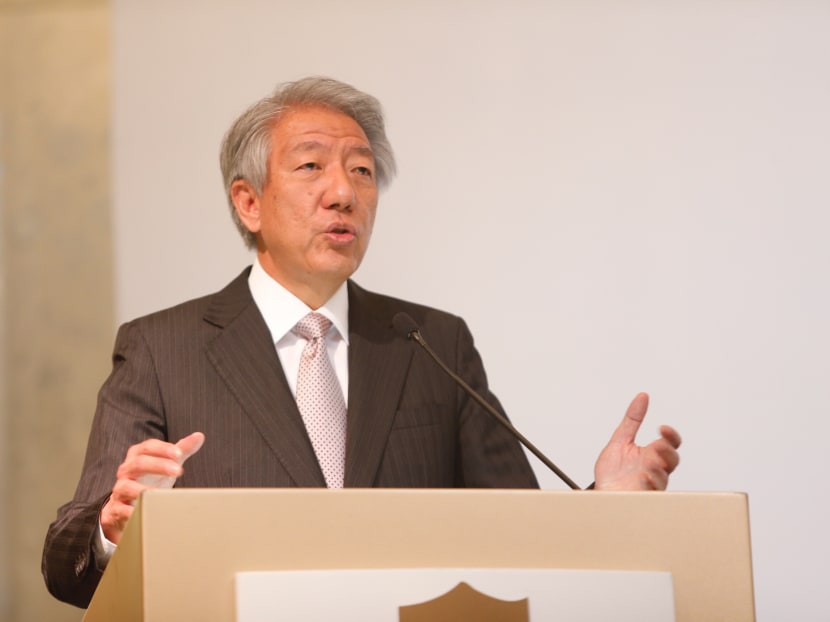Common interest in region’s peaceful growth greater than differences: DPM
SINGAPORE — Despite occasional differences in views, Singapore and China share a greater common interest in the region’s peaceful growth and development, Deputy Prime Minister Teo Chee Hean said on Wednesday (May 24).

Deputy Prime Minister and Coordinating Minister for National Security, Teo Chee Hean, addresses the audience during the EAI's 20th Anniversary conference held at Shangri-La Hotel's Tower Ballroom. Photo: Najeer Yusof/TODAY
SINGAPORE — Despite occasional differences in views, Singapore and China share a greater common interest in the region’s peaceful growth and development, Deputy Prime Minister Teo Chee Hean said on Wednesday (May 24).
Speaking at the 20th anniversary celebrations for the East Asian Institute (EAI), held at Shangri-La Hotel, Mr Teo noted that both countries share similar views on most issues, and have worked together to advance their common interests.
“But even among close neighbours and friends, there may be different perspectives on some issues, given that countries are of different sizes, have different histories, vulnerabilities, and geographical location,” said Mr Teo.
“But the fundamental position of our two countries, that we share a common interest in the peaceful growth and development of our two countries and the region, remains the same. Our common interest in building a peaceful and growing region is much greater than any occasional differences of views.”
Mr Teo added that Singapore has been a consistent friend to China over the years and will continue to be a supporter of its peaceful development.
He highlighted the numerous government-to-government projects, including the Suzhou Industrial Park and Tianjin Eco-city, as well as top-level exchanges such as the Singapore-China Forum on Leadership.
Mr Teo also said he has personally seen China’s transformation through his many return trips and interactions with Chinese leaders since his first visit to China in 1984. Two of these, in the last three months, were the 13th Joint Council for Bilateral Cooperation held in Beijing, and the 6th Singapore-China Forum on Leadership that took place here last week.
“Such dialogues reflect the high level of mutual trust between our countries, and our mutual desire to learn from the experiences of each other. It is a unique dialogue for both countries,” Mr Teo said. “They also provide a valuable platform for a new generation of leaders from our two countries to develop a deeper understanding and appreciation for each other.”
Having grown economically and militarily, China is expected to play a greater international role, such as via its Belt and Road initiative, and the Asian Infrastructure Investment Bank, noted Mr Teo, who shared three hopes he has for China.
“First, that China is stable and prosperous, and even more integrated with the region and the world. Second, a China which continues to contribute to developing international norms and rules for the benefit of all, in order to preserve peace, stability, growth and development. Third, for a China that draws on its long history and deep culture to find a harmonious blend with modernity, as China continues making its societal transformation,” he said.
Mr Teo added that Singapore will continue to be a strong and principled supporter of China’s peaceful development and constructive engagement in the region. “I am optimistic about China’s potential to continually reinvent itself and play a greater leadership role both within the region and globally,” he said.
Mr Teo’s speech came amid mounting speculation over the state of Singapore-China ties, in the wake of Prime Minister Lee Hsien Loong’s absence from the recent One Belt, One Road summit in Beijing, which was attended by several regional leaders, including Mr Najib Razak of Malaysia and Indonesia’s President Joko Widodo.
Singapore was represented by Minister for National Development and Second Finance Minister Lawrence Wong. When asked at the summit why Mr Lee did not attend, Mr Wong told the media that it was China that had decided on the invitations.
In his wide-ranging speech on Wednesday, Mr Teo, who was the guest-of-honour at the forum, said East Asia was in the midst of another period of transition and change.
Hong Kong is due to mark the 20th anniversary of its return to Chinese-rule, while cross-strait relations have become more complicated on the back of changing domestic politics in Taiwan, he added. Mr Teo noted that Hong Kong’s stability and prosperity are “best assured under the ‘One Country, Two Systems’ framework as an integral part of China”.
On Taiwan, he said Singapore has always maintained the “One China” policy, citing how, as “an old friend of both sides”, the Republic hosted the historic 1993 Wang-Koo talks and the 2015 Xi-Ma meeting. He added: “(We) will continue to support the peaceful and stable development of cross-strait relations.” Japan and South Korea are also anxious about an increasingly provocative North Korea, he noted.
The EAI was set up in 1997 within the National University of Singapore as a research institute focused on studying contemporary China and its neighbours. A public forum was held at the Shangri-La Hotel on Wednesday to mark the anniversary.






